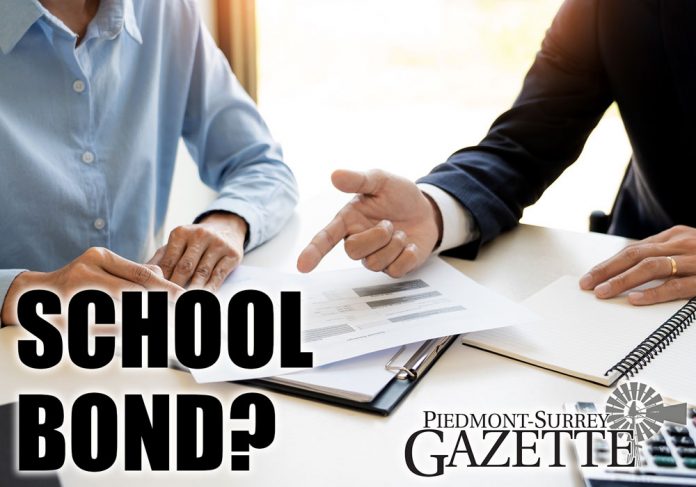By Mindy Ragan Wood
News Editor
If Piedmont Public Schools administration has its way, the district will have a bond on the ballot in time for a February election.
The move could put off the City of Piedmont from seeking its own bond on a ballot to improve up to $10 million worth of battered roads in city limits.
Piedmont Schools Superintendent James White told board members Monday night the district needs to improve the burgeoning middle school and stay ahead of the growth trend.
President of Municipal Services Inc., Rick Smith, for the City of Piedmont said he would not recommend two bonds at one time in a community.
“The district and the city officials should coordinate the bond election process,” Smith said.
“We typically wouldn’t recommend the city go for a bond at the same time as the schools.”
Smith said two bonds during the same voting period often confuses voters.
“It’s a lot to educate the voters about,” Smith said. “You have a situation where school district boundaries are outside the city limits so there can be some confusion often as to what they’re voting on, (and) who’s voting.”
Piedmont City Manager Jason Orr said he believed voters would favor a school bond over a road bond and the council is considering all options to fix roads.
Smith agreed voters are more likely to vote for a school bond and decline a city bond.
“Because of the public education component and the impact it has on students,” Smith said.
SCHOOL BOARD TO CONDUCT SPECIAL MEETING
During Monday night’s meeting board of education members listened to a presentation from the district’s bond professional, Jordan Smith of the Stephen L. Smith Corporation.
The district’s growth is on target to climb sooner than later with more than 1,000 homes currently under construction within the Oklahoma City limit and Piedmont district’s boundaries. Additional housing developers are seeking zoning applications to begin construction.
“You know more than I do that your enrollment is continuing to move,” Smith said. “You’re constantly straining your facilities. You’re constantly doing everything you possibly can as a board and as a community, but when you’ve got growth that just grows this much…it just is always hard to tackle.”
The net assessed valuation for homes in the district continue to climb as well as financial growth in assessed value and ad valorem tax.
“It also brings students to fill those seats,” said.
Piedmont passed a $71 million bond for capital projects in 2016. It will not be paid off until 2029, but the district seek an additional $35 million. With a proposed 4 percent interest rate and costs, the bond would net “$27.6 in actual spendable dollars,” Smith said.
It would be paid in 2029, but there’s a catch.
“Now you can’t do this proposed bond without any tax increase,” Smith said.
The additional cost to homeowners is estimated to be $5 every month for every $1,000 paid in property taxes.
ACT NOW
The rush to consider a bond comes on the woes that a presidential election brings to the financial market.
Board President Jerrod Moser expressed his concerns.
“It seems like to me it would be good to get a low interest before the election,” Moser said.
“Because who knows what could happen at that point.” Smith agreed.
“We saw how things took off in this last election the very next week with that vote, so it can have a tremendous impact, absolutely,” Smith answered. “We’re trickling down to some of those 40-year lows, but we’re not quite that low yet. I want to be clear about that, but it’s phenomenal money right now.”
Smith said he realized tax increases are never popular, but the board would have to decide how urgent the district’s needs are.
“Oftentimes the crux of the question really boils down to, how bad are your needs and can you afford to put those off? You can afford to push it off, you don’t have students beating down doors and standing in the hallways for seats and so forth. Sure the dollars will go up, that brick is going to cost more in five years but if you don’t need it right now it’s not necessarily that important right now. The flip side is, if you need it right now there’s an element to the cost on the financial side that becomes much, much secondary. It’s drastically reduced.”
Smith used the analogy that if your child is sick, “it doesn’t matter how expensive it is, you take them to the doctor and you don’t take them to the worst doctor you can find, you take them to the best doctor you can find.”
Tax increases is not something voters “ever like,” Smith said. “We’re dealing with these issues because we’ve got problems and we want to deal with them in the best way possible.”
PROJECTS
While the presentation did not include specific projects that would be proposed for the bond, White said the middle school is nearly full and the cafeteria is inadequate.
“Middle school needs some attention,” White said. “It’s been one of the few places we haven’t been able to touch in these last few (projects). I think always with the need for additional classroom space…the cafeteria is pretty small for that size. Continue with athletic upgrades as we continue to develop into a larger school. I think those are the things that are more necessary. We still have some projects (from the last bond) that haven’t gone out for bid yet, and we’ve been able to save dollars on that.”
The board plans to meet November 20 for a special meeting to discuss and possibly pursue a bond for the spring ballot.






